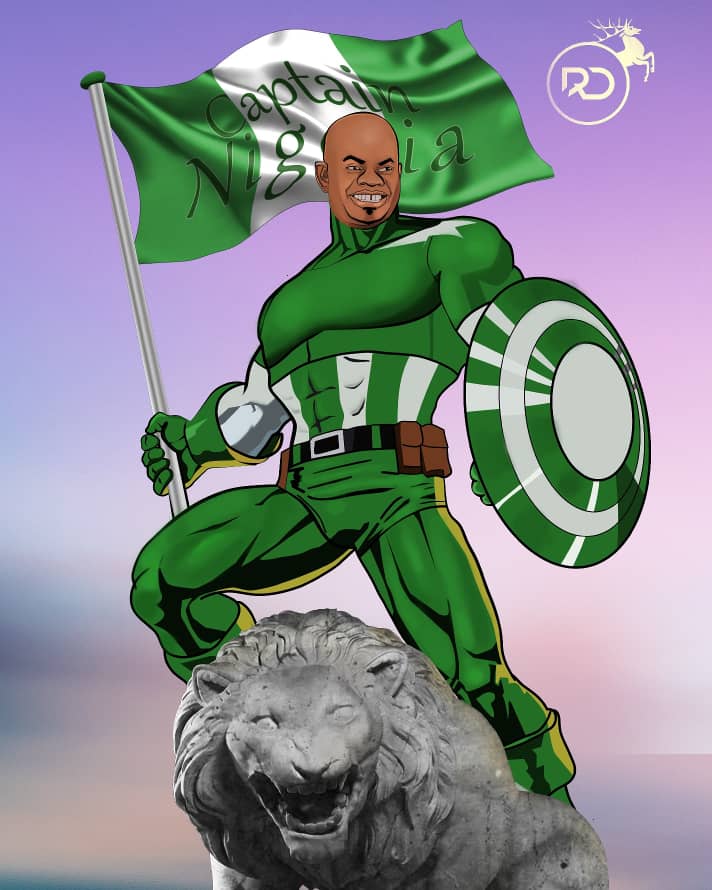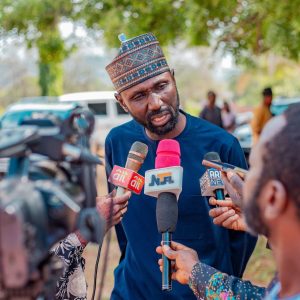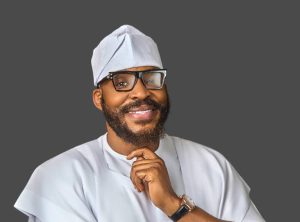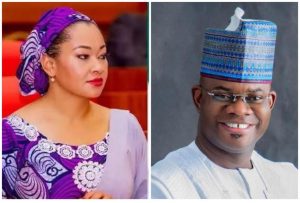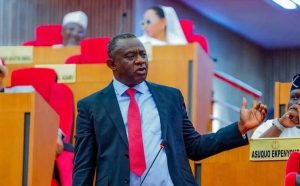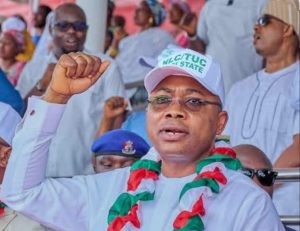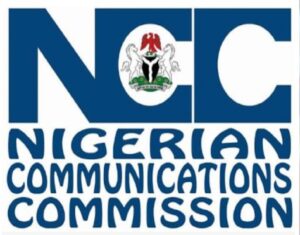Yahaya Bello: A Lion’s Edge
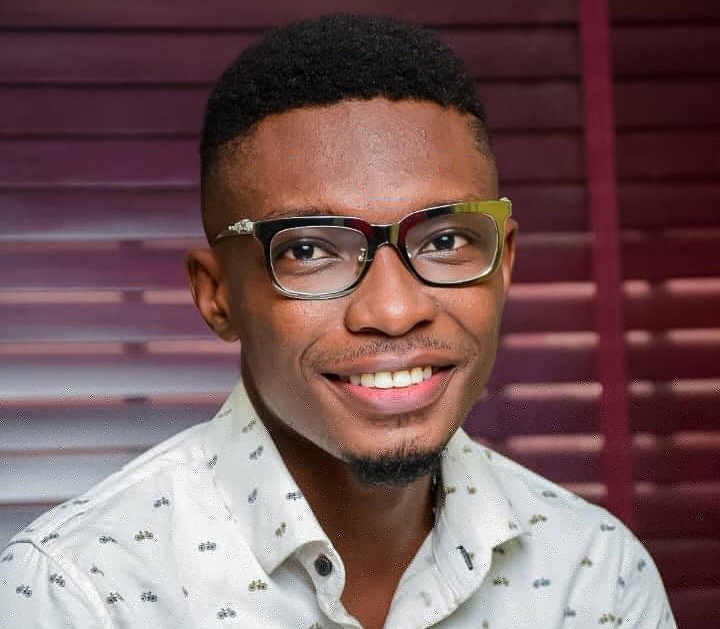
I am determined to paint a true picture of this man, Yahaya Bello.
I am fully committed to this cause because the destiny of Nigeria and Nigerians might rely on the ability of young people within and outside the country to see things for what they are, and not as they are portrayed. Like I always say, in order to begin to experience sustainable change, we have to start making deliberate moves that will secure our collective futures.
After all, Nigeria “na our own”.
I often wonder how, however exciting the thought of travelling out of the country might be, less than 10% of Nigeria’s population can actually afford to do that, leaving a larger part of the populace to pursue their fate within the country. Even if it were possible for all to leave, being a Nigerian and hearing only negative news emanating from the country of your birth is certain to leave a sour taste. This is the truth that even the hardest of critics must admit, leaving us with one option and one option only.
We have to build a nation of our dreams.
While I was growing up, almost every Nigerian was mentally invested at the prospect of a certain “Vision 2020”. 2020 painted a picture of a blossoming economy, a thriving healthcare sector, industrialism and a country rated internationally as a go-to educational hub. I would fantasize about the year 2020 when my neighbourhood in Dakata, Kano State – where I grew up – would be covered with skyscrapers, plush greenery and miniature, high end five-aside pitches akin to those I watched on American movies.
2020 gave me and a lot of other young Nigerians a thrill of expectation like none other. As much as I hated watching the news, my late Father would insist that I concentrate, take notes and fill him in on every single detail when he got home from work. The news was, quite often, filled with a lot of bad tidings and I remember thinking, rather childishly, that 2020 was coming soon: A year when everything would be perfect and Nigeria would become the envy of all.
We are now in the year 2021, still dealing with 2002 problems. What exactly is the problem?
I would say that we have been caught in somewhat of an anticlimax. Despite a glaring improvement in infrastructure and a more expansive road network around the country, there is still a huge gap between where we are and where we ought to be. There is a feeling of underachievement all around, pungent and pervading.
What alarms me more than anything is the division that has sought to come between us all. The recent killings in Shasha, Oyo State points towards a rather familiar, unfortunate yet preventable occurrence in the infamous annals of Nigerian history. The shocking numbers of innocent Nigerians – as propagated by media houses – who lost their lives gives me the chills every time I come across it on social media. This is because as a typical Nigerian, which I consider myself to be, the division of Nigeria and Nigerians causes a shiver to run down my spine.
What is a typical Nigerian, if one may ask?
I am a Kogi State citizen from North-Central Nigeria. I was born and brought up in Kano, North-Western Nigeria. I started and finished my Primary and Secondary school education in Kano, and proceeded to Edo State, South-Southern Nigeria to complete my University Education. I speak fluent English, Pidgin, Yoruba and Hausa. In one lifetime, I, who originated from the North-Central, has transversed from the North-West to the South-South in search of a better life.
This is the story of a typical Nigerian.
As a country harbouring over 300 tribes with a thousand languages within them, it is difficult how we expect to survive without each other. It is not surprising to find millions of Igbo traders in Northern Nigeria, just as it is easy to find Hausa businessmen in Onitsha, Lagos and Port-Harcourt. The boisterousness of the Yoruba race is always at close proximity in Warri, Benue, Kaduna and Maiduguri, ensuring that a Nigerian from any part of the country finds a home within any State in Northern, Southern, Western or Eastern Nigeria.
This was how Nigeria was built to last. Why then, do we think a tribal or religious warfare will be of benefit to ANY of these tribes?
We must realize that religious and tribal warfare has become a tool used by members of the “club” to cause division between innocent, nonplussed Nigerians for their personal gain. It was used in the infamous Kano riots in 2000, 2001 and 2008 Jos crisis, Miss World Riots in Kaduna and several hundreds of other less known, fatal conflicts around the country. It was used to great effect a few weeks ago in the ongoing Gombe Traditional Title crisis. At one stage or another since the amalgamation of the Northern and Southern protectorates, Nigerian history has been over washed with needless, tribal or religiously motivated deaths.
When will this end?
The outpouring of emotions and anger by the youth during last year’s #EndSARS campaign points towards a generation that is tired of the current state of affairs. What has happened to the oath sworn by our leaders in keeping the peace and promoting “One Nigeria”? How long shall we allow a certain “club” of selected, vicious leeches play politics with the lives and livelihoods of the regular Nigerian, whose only aim is to live in any part of the country in peace and unity? What will become the fate of people who only seek to live their day-to-day lives without any care in the world as to which tribe their neighbours belong? Shall we let them be consumed by the gimmicks of mentally retired but not tired, so-called leaders?
What about the “labours of our heroes past”, shall it be in vain?
God forbid.
I am asking these questions to you, a Nigerian who has the good of Nigeria at heart. I understand that these are deep questions regarding, for the good of Nigeria, quick answers which will demand a sterling solution in the nearest future.
However, what if I told you that there was no need to look any further? What if I told you that we still had hope for the Giant of Africa? What if I let you know that a prototype of a working system, tried and trusted, applied and working, currently exists at the same point where the Niger Area became “Nigeria”, which we all call home? What if I let you know that there is hope for the common man? Hope for the Igbo, Hausa and Yoruba, Tiv and Jukun, Efik and Igala, Gwari, Fulani and Kanuri and over 300 other tribes?
Hope in the form of a man.
In the entire 36 states and the FCT that make up Nigeria, no region can boast of being bordered by 10 states on every side – except Kogi. What this means is that Kogi harbours an influx of passersby and immigrants of various tribes more than any other state in the country. Tens of thousands of travellers pass through Olamaboro and Okene, Egbe and Koton-Karfe, Kabba and Ogori-Magongo and many other border towns. Many of these people settle within the state to conduct their businesses, thereby creating hundreds of colonies of tribes and cultures. People with different and peculiar lifestyles, differing religious backgrounds and cultures. All of them currently living within Kogi State in peace and harmony.
It is important to realize that it was not always like that. Someone made it happen.
Alhaji Yahaya Adoza Bello. A lion with the audacity to command change.
Yahaya Bello has always addressed the unification project singularly as his biggest achievement thus far in Kogi State. It is of little surprise to those who have seen him do it time and again to see him wade into the Northern Farmers/Western food blockage crisis, and come out with both parties feeling enormously better going forward. Despite the immense relief at nipping an impending disaster in the bud, he admitted to having been challenged by some members of the “club”. These are the people who benefit from chaos. People who have ALWAYS benefitted from chaos, knocking the heads of Northerners and Southerners, Easterners and Westerners solely for their personal aggrandizement.
Expired commodities made relevant by religious and tribally motivated politics.
The Chairman of the Christian Association of Nigeria (CAN), His Eminence Supo Ayokunle described Yahaya Bello as a person who had the “spirit of God” after displaying “fairness and equity” in the governance of Kogi State. He said this just last week Monday, the 8th of March during the official dedication of the Government House Chapel: a historic building constructed after a 28-year period when Christians did not have a place of worship in the Kogi State government house. On that day, Bello, a devout Muslim, was bestowed with a prestigious award as “The friend of the church”. Ayokunle, who struggled to quantify the level at which Bello had delved to promote unity within his people, prayed that Governor Bello be given a “higher task” where the leadership skills he has demonstrated in Kogi State will be at the beck and call of all Nigerians.
These are heavy words which anyone with a spiritual inclination must take very seriously. These are words that make or break people. These are words that anyone would be proud to be associated with. However, we are all aware of hundreds of Nigerian leaders that have said these same words but never put it to practice. As you read this, I am sure a few names will come to mind. What this says to you, the reader of this piece, is that no one can do these things repeatedly without having the heart of a leader. The heart of a person that pursues unity.
That is the job of a Unifier.
That, and more, is what Nigeria needs.
I doubt if it was possible about six years ago to speak about terrorism without mentioning Kogi. I sincerely doubt if it were also possible for three months to go by within the state during that period without a record of heartbreaking deaths linked to tribal discord. Ethnic divide was a tool that had been used effectively by past political leaders so much so that it had become status quo.
Yahaya Bello inherited a state that was largely divided along ethnic and religious lines. He was set up to fail. The opposition probably expected him to self-implode within a few months of taking office.
Imagine their surprise.
How then has the government of Governor Yahaya Bello been able to maintain peace and tranquility in the same state that was once defined by her high insecurity and tribal warfare?
I can assure you, it was not magic. It was a simple case of purposeful leadership.
Bello recognized, first of all, that it was impossible for us all to live without each other. He ensured that the intellectualism of the Okun people found a perfect mix with the strength of the Igala and ingenuity of the Ebira, creating a formidable unit. He outlawed tribalism and religious disunity in all its form, made certain that it reflected in his appointments across board, and turned a deaf ear towards those who would advise a marginalization of the any tribe residing in Kogi State, recognizing the folly in that line of action. His words aligned deftly with his actions, and slowly but surely, disbelieving believers began to see the wisdom in promoting peace between all tribes and religions in the state.
Yahaya Bello understands this because he is a typical Nigerian, a lover of all irrespective of tribe or religion. Born in Okene, the quest for education took him to Niger and Kaduna States later in life. As a budding businessman, he achieved tremendous success establishing his famous transport business,” Fairwin” in Benue State, further expanding to Lagos and other Nigerian states. If Nigeria were not one country, would the man we all regard as the “White Lion” be who he is today? Look back at your own history as a Nigerian, would you be where you are today if certain doors had not been opened to you in various Nigerian states?
The late Nelson Mandela, a renowned promoter of peaceful coexistence between all races and tribes once said that “Peace is the greatest weapon for development that any person can have”. Bello digested this and ensured that nothing he did was in aversion of this set down rule. Everyone would agree that development can hardly be found in places with conflict, which could explain why Kogi had such a huge infrastructural deficit before Bello’s arrival.
To give an accurate illustration, Kogi now has a thriving agricultural sector with two major Cashew processing plants under construction in Kogi State, the Osara green house project, a completed 4-Billion Naira Omi Rice Mill project in Ejiba and over 120 tractors distributed to the 21 LGAs of Kogi State in the past two years. Kogi, under Bello’s supervision, is also grooming an ever improving medical sector with the establishment of 10 medical centers around the state: One of which is the multi Billion Naira 300-bed capacity Reference Hospital currently under construction in Okene.
The Multi Billion Naira Ganaja flyover in Lokoja which is under construction in Lokoja is set to change the outlook of the capital city, ranking highest in a series of awarded and completed road projects around the State such as the Ankpa township road, Okene township road, Okpo-Olamaboro road projects amidst an abundance of others.
All these and many more pointing to the fruit of the peace promoted by the New Direction government.
The Nigerian coat of arms symbolizes what makes us Nigerians, and even that image professes that there cannot be unity without faith, and postulates that peace is the only penchant for progress in our society. Kogites are united under the faith of the EBIGO agenda under Bello. The result of this has been a prolonged spell of peace, evident in the infrastructural, educational and human capital development in Kogi State. If the Nigerian youth are truly ready to take over and not just take part, we must act like it.
We must demand for this sort of leadership at a national level.
During his inauguration speech in 2016, Bello made a very salient statement which I must bring to all of our notices. Speaking emotionally on that historic day, he said that “Change has come to Kogi State. I may be the torchbearer and custodian of it, but you, the great united people of Kogi State are its owners and proprietors. Let us arise together, take our collective destiny in our hands and go forth excitedly to chart our New Direction.”
He concluded by stating emphatically, “Kogi, this change is yours.”
Kogi took the change and the fruits are obvious for all to see. We must tow the same line, promote peace and resist ethnic jingoism. We must line up behind a proven bridge builder. We must embrace the ethnic metanoia that Bello preaches. We must #BellowBello.
Nigerian youths! What are you waiting for?

